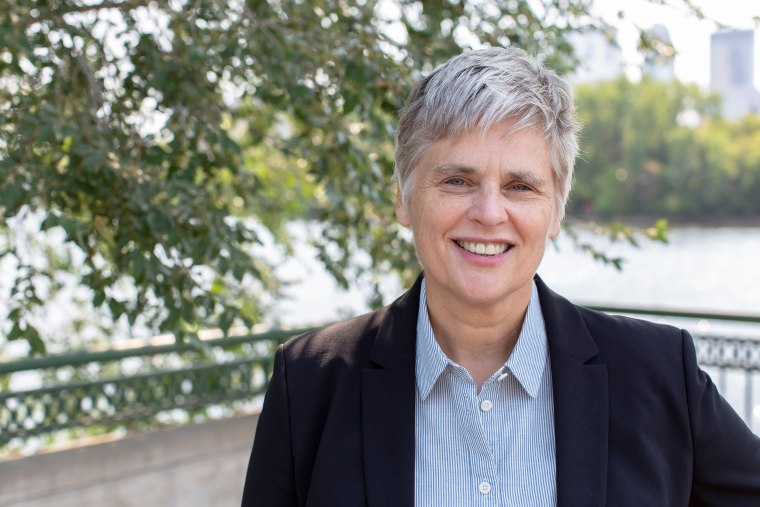Minnesota political candidate Mary Moriarty decided to share her authentic self with her constituents earlier this year. Moriarty, a candidate for Hennepin County attorney — whose jurisdiction includes Minneapolis — came out as queer on the campaign trail in January.
“It could be a risky thing, coming out publicly during the campaign, but I felt it was important,” Moriarty told NBC News. “This was a big, big decision for me. I hoped it would help people struggling with their identity.”
In speaking publicly about her sexuality, Moriarty joins an increasing number of politicians willing to do so. A record number — over 1,000 — openly LGBTQ candidates ran or are still running for office this year, LGBTQ Victory Institute’s annual “Out for America” report found.
Despite the increase in the number of out candidates, there are still, at most — if not all — levels of government, elected offices that have never been held by an openly LGBTQ person.
In August, Moriarty came out on top of her nonpartisan primary race with more than 36% of the votes cast, which was twice as many as the next candidate, Martha Holton Dimick, whom she will face off against in November.
If elected, Moriarty would be the first out LGBTQ woman to serve as Hennepin County attorney, the equivalent of district attorney in other parts of the country. She said she hopes to use the position as a platform to address issues of injustice in the legal system.
Speaking out against the status quo
Moriarty said she did not plan on running for office. She spent over three decades as a public defender in Hennepin County, and in 2014 she became the county’s first female chief public defender.
“It was very meaningful at the time; it still is. I can’t tell you how many parents of young girls told me that it meant a lot to them — that they could be in a position of leadership,” she said.
In her role, Moriarty broke with tradition and spoke publicly about issues of racial injustice in the criminal justice system.
“Historically, the chief public defender kept their heads down and tried to make sure people could represent clients as best as possible but haven’t spoken out about systemic change,” she said. “I had been talking about race and the policies of the current public attorney. … I got in trouble for that. I got accused of calling a justice partner a racist in public.”
Moriarty wasn’t reappointed as chief public defender after that, she said.
“What I took away from that particular instance was how difficult it is for people to speak out publicly against the status quo,” she said.
Moriarty decided to retire from public defense in 2021. The extra time allowed her to delve into the details of former Minneapolis Police Officer Derek Chauvin’s trial for the murder of George Floyd. She once again spoke publicly, this time in her capacity as a professor at the University of Minnesota Law School and as a commentator for national news outlets.
She said she wanted to demystify what she believes is an intentionally complex legal system and to educate the public about the need for police accountability.
Floyd’s death also prompted Moriarty to consider public office.
“I decided to run because, after George Floyd was murdered, I saw for the first time in my career an opportunity for racial reckoning and how the system has treated marginalized communities and how the system has utterly failed to keep people safe,” Moriarty said.
Minnesota has one of the lowest incarceration rates in the country yet has some of the most glaring racial disparities. For example, the incarceration rate of Black people in the Twin Cities is 11 times higher than the rate of whites, according to data from a 2019 NAACP report.
Running for this office, Moriarty said, is a “huge opportunity to do things in a different way.”
“Prosecutors and judges have looked the other way,” she said. “If we are going to change how the police department relates to the community, the county attorney has to step up.”
'We have a lot of work to do'
Moriarty said events like National Coming Out Day, which has been celebrated on Oct. 11 annually for over three decades, are especially important because of the challenges lesbian, gay, bisexual, transgender and queer people continue to face in many parts of the country.
“It comes at a time when this country is incredibly hostile to the LGBTQ community,” Moriarty said. “In many areas of the country, it is not safe to come out.”
As a public defender, Moriarty said, she saw the legal system let many LGBTQ people down.
“The system has certainly not treated LGBTQ people well at all,” she said, citing the situation of homeless youth, many of whom are transgender. Once they become unhoused, she explained, many are criminalized “simply because they don’t have a place to live due to their identity.”
Moriarty also pointed to the local political context. Earlier this month, the Republican candidate for governor repeated a false internet rumor about Minnesota schools providing litter boxes for children who identify as “furries.”
“Look what’s happening all over the country, in Florida and Texas,” Moriarty said, referring to anti-LGBTQ legislation passed in those states. “It’s not particularly safe for people to come out.”
“We have a lot of work to do in this country,” she added. “I will be working on some of that in this office, should I win.”
Follow NBC Out on Twitter, Facebook & Instagram.
